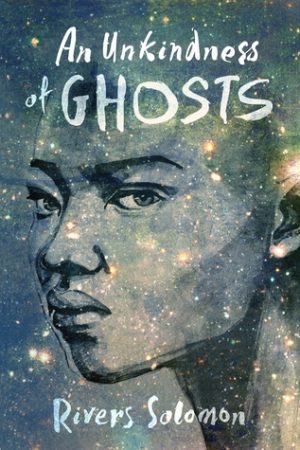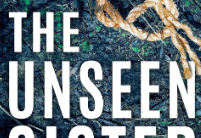 An Unkindness of Ghosts
An Unkindness of GhostsBy: Rivers Solomon
Release Date: Oct 3, 2017
Publisher: Akashic Books
Award: Stonewall Book Award Nominee for Literature (2018); Lambda Literary Award Nominee for LGBTQ SF/F/Horror (2018)
Rating:
It has been a very long time since any book has made me want to pick up my old quote journal and copy lines down. The journal isn’t pretty. It’s not one of those moleskin bullet journals, just a pocket sized notebook an old teacher gave us with some inspirational quotes after high school graduation. I’m not sure where it is now. I never thought I’d go looking for it again. But An Unkindness of Ghosts by Rivers Solomon made me want to dig that notebook out and copy down lines right from chapter 1.
An Unkindness of Ghosts follows Aster, an intersex person who lives on a multi-generational starship escaping a destroyed Earth with race relations that are comparable to the antebellum American south. Aster is a person of color, a low decker, a healer, a scientist, and angry. When a link between her mother’s suicide and the sovereign’s recent death rises, Aster embarks on a mission to find the truth about her mother’s death and perhaps incite the beginnings of civil war in the process.
The story is told largely from Aster’s point of view and mostly from a third person point of view. A couple of chapters do switch to first person point of view, always This flip in character and point of view didn’t feel out of place, however, largely because of how the book is structured. Though only one volume, the book is broken into three parts. Each part begins with a shift in person and point of view before reverting back to the familiar format of the start of the book. This gives a bit of a closer look into the mind and feelings of the other two important characters and allows us to see these events from different eyes.
The way this ship was set up was not something I’ve seen too much of but was very fascinating. Each level of the ship has its own culture. They have different spoken and written languages. Gender and identity are treated very differently from one floor to another. The lack of a planet to call home has not erased the culture of individual peoples or nations, but has grown stronger and changed into a culture of one floor.
But people are still people. And people are quite horrible all too often. The downside to this great ship flying through space is the monarchy, the classism, and the blatant racism. The lower decks are inhabited largely by people of color who are subjected to strict curfews and forced to work in the fields and doing other hard labor no one else is terribly keen on doing. Our main character, Aster, is from these lower decks.
The story is dark. Very dark. All of the atrocities committed in the antebellum south are suffered by the low deckers. Yet, these abuses aren’t show directly. They are spoken about as an inevitable, something the characters cannot avoid and cannot stop. This isn’t a story of blood and gore and visible violence. It is a story where these are common, where they are spoken about in stark clarity, where there is no horror in the voices of the victims. There is something inherently more unsettling, more awful when depicted this way.
Aster is angry. Rightfully angry. She doesn’t always make the right choices. She doesn’t always spare herself or even those around her from avoidable pain. Aster’s proud, strong, and wonderful. I really liked reading from her perspective. She was a fascinating character, never giving in or saying no. Aster is also neuroatypical, something that shapes the first third of the book. Most things are taken literally by her and she doesn’t always understand the actions or motives of those around her when many readers would. This leads to the discover that while Giselle, her friend, has always known the journals of Aster’s mother are written in code, Aster herself has lived ignorant of this fact for 25 years.
Religion also plays a large part within the story. The sovereignty use religion as a basis for their rule. The upper deckers use religion and the apparent transgressions of the lower deckers as reason to treat them so awfully. Yet, religion isn’t portrayed as wholly evil. Theo, Aster’s close friend and potential love interest, is a very religious individual. Aster and Theo get along very well though, religion never being too much of an issue between them, and Theo having none of the same bigoted, religiously fueled opinions as other upper deckers.
The ending of the novel leaves things a bit open ended while remaining a satisfying conclusion. We don’t know exactly what happened to each character, but making deductions isn’t terribly difficult. There is a very hopeful air about the ending, a feeling that everything will turn out alright given some time.
No matter what I say about this novel, it will not be enough. This is a book that can be parsed and discussed nigh onto forever. It’s a book whose praises I want to sing. Its a book I beg you to read. An Unkindness of Ghosts by Rivers Solomon is a fantastic science fiction novel. It never stumbles into the pitfalls other debut novels too often do. This is one of the best sci-fi novels involving generation ships I’ve ever read, and I cannot wait to see what else Rivers Solomon has in store for us.






Post a comment